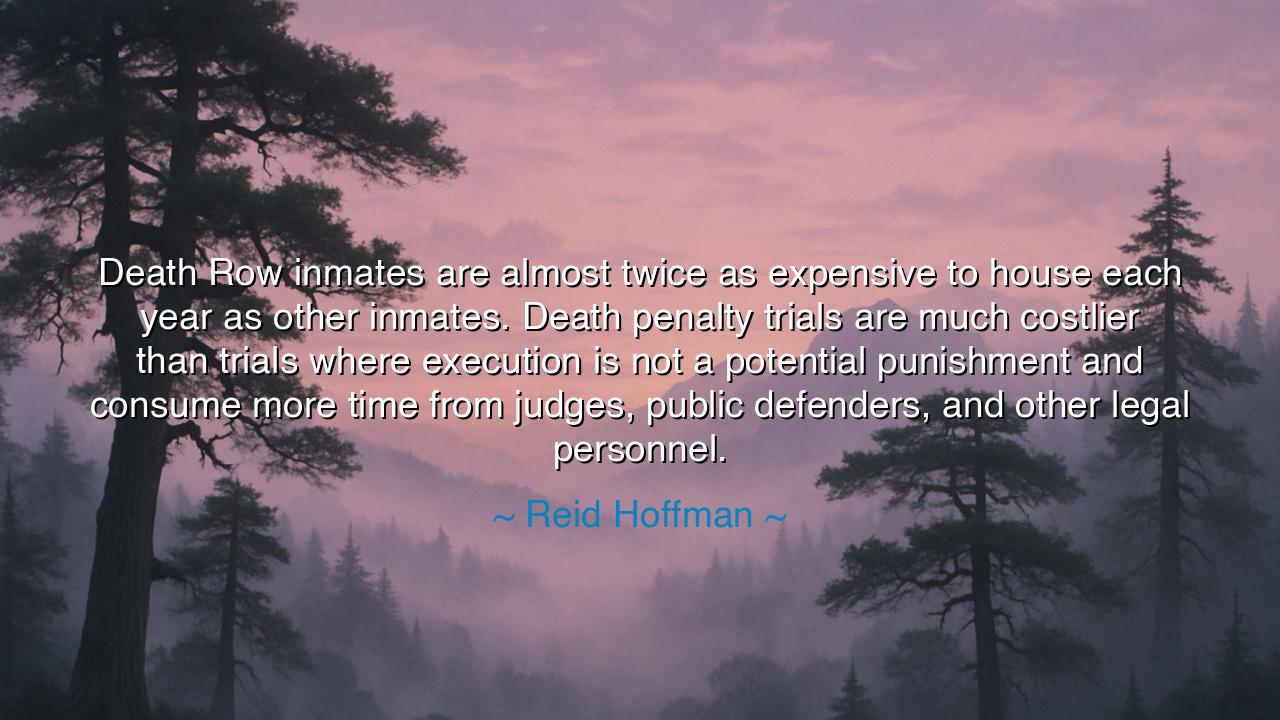
Death Row inmates are almost twice as expensive to house each
Death Row inmates are almost twice as expensive to house each year as other inmates. Death penalty trials are much costlier than trials where execution is not a potential punishment and consume more time from judges, public defenders, and other legal personnel.






Hear the sobering words of Reid Hoffman: “Death Row inmates are almost twice as expensive to house each year as other inmates. Death penalty trials are much costlier than trials where execution is not a potential punishment and consume more time from judges, public defenders, and other legal personnel.” In this statement lies a paradox that has haunted civilizations across ages: the belief that death brings swifter justice, when in truth it brings heavier burdens—upon the courts, upon the coffers, and upon the conscience of society itself.
The meaning of this quote is sharp and unsettling. Many suppose that the death penalty saves resources by cutting short the lives of those condemned. Yet Hoffman reminds us that the opposite is true. The path of execution demands years of trials, appeals, and endless reviews, lest injustice slip through the cracks. The very weight of death as punishment requires extraordinary care, for to execute the innocent would be a crime beyond repair. Thus, in seeking the finality of death, society pays in gold, in labor, and in years of toil from its servants of the law.
This truth is no new discovery. In the Middle Ages, rulers who employed execution as their chief tool of justice often found their courts clogged and their treasuries drained, as cases multiplied and defenses grew desperate. By contrast, societies that turned to exile, imprisonment, or restitution often found swifter judgments and fewer appeals, for the consequences, though heavy, were not final. The wisdom of the ancients thus returns: when punishment is irreversible, the machinery of justice must grind more slowly, consuming more of the state’s lifeblood.
Consider the story of Illinois in the modern age. In 2000, Governor George Ryan declared a moratorium on executions after a series of wrongful convictions were uncovered on Death Row. In time, the state abolished the death penalty altogether. One of the reasons given was not only the risk of injustice but also the immense costs—millions spent on endless trials and appeals, money that could have been used for schools, community safety, or rehabilitation. Here we see Hoffman's warning proven true: the pursuit of execution drained society of resources that could have healed rather than harmed.
The deeper lesson in Hoffman’s words is that justice must weigh not only morality but also practicality. A punishment that consumes more than it preserves weakens the very society it seeks to defend. Judges and public defenders, meant to serve the many, become bound for years to a single case. The state spends far more than it would to simply imprison. And in the end, the people inherit a system that bleeds itself dry in the name of retribution, rather than turning its wealth toward life and renewal.
For us, the charge is clear. We must ask not only whether the death penalty is just, but whether it is wise. Does it preserve or waste? Does it heal society, or deepen its wounds? Practical action may begin by supporting reforms that value life imprisonment over execution, by demanding that public resources be used to strengthen communities rather than pursue a punishment that drains them. By educating ourselves and others about the true costs—not only moral, but material—we arm ourselves with the knowledge to choose a path of wisdom.
Thus, let Reid Hoffman’s words be carried forward: the price of death is far higher than we imagine, not only in coin but in the spirit of justice itself. To pursue execution is to bind ourselves to endless burdens, while to choose restraint may free our resources for renewal. The ancients would say: justice is not only the sword, but also the scale. And if the sword weighs so heavily that it breaks the scale, then justice is lost. Better to preserve balance, to preserve life, and to preserve the strength of the community for generations to come.






AAdministratorAdministrator
Welcome, honored guests. Please leave a comment, we will respond soon